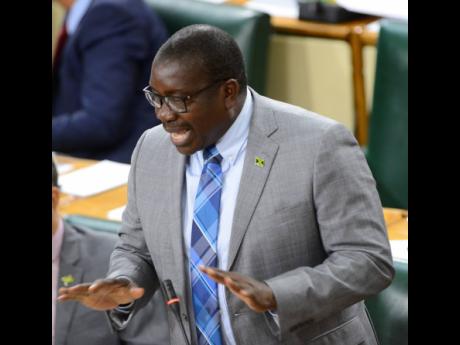JUTC, MoBay Metro revenue down 40%, says Montague
The Jamaica Urban Transit Company (JUTC) and the Montego Bay Metro have been hard hit by the COVID-19 outbreak that is now into its seventh month in the island.
Even with the reigniting of commerce since the frigid lockdowns of the early months, the bus companies have bled revenues of around 40 per cent, said Transport Minister Robert Montague.
An islandwide curfew runs from 8 p.m. to 5 a.m. daily, grinding to a halt wheels that would normally have run up to 10 nightly.
Tuesday’s announcement by Prime Minister Andrew Holness of stricter curfews for the communities of Whitfield Town, St Andrew, and Waterford, St Catherine, will only add more pain as coronavirus restrictions continue.
Stay-at-home orders for the elderly and an evolving work-from-home culture have also hurt the JUTC and MoBay Metro’s bottom line.
“It has really hit us,” Montague told The Gleaner on Tuesday during the handover of two school buses at his Maxfield Avenue offices to Tacky High and Mile Gully High.
He continued: “Our programme to allow first responders to ride free has affected the revenue base, but it is a national effort and we all have to come together and do what we must.”
Montague said adjustments to revenue projections were automatic because of the plunge in ridership and reduced hours of operation.
Before the onset of COVID-19, more than 200,000 people within the Kingston Metropolitan Transport Region, Spanish Town, and Portmore travelled on JUTC buses daily.
The minister is currently in discussions with the Ministry of Finance for supplementary budgetary support.
STAFF RETAINED
Though earnings have fallen, the JUTC has retained all staff and there are no immediate plans for lay-offs.
Instead, the state-owned entity is working on reducing costs and has fast-tracked an initiative that will save an average of five oil changes each year per bus.
“We are moving to biodiesel, so that will lower our fuel bill, which will go towards running the entity. The last thing we want to do is to touch our greatest asset, which is the human resource. But we are not closing the doors,” Montague said.
The JUTC has closed some of its offices, allowed some of its staff to work from home, and has moved into a shift system as part of its austerity measures.
Montague said that an internal committee was moving to implement recommendations in response to a scathing auditor general’s report tabled in July that cited multiple breaches, including the unapproved hiring of staff above the capacity of the entity and hundreds of millions of dollars in overtime payments.
The minister said that the historical management inefficiencies were institutional and not tied to a specific administration.
“An audit report is a management tool, it’s a very valuable tool and it is helping us with some of the initiatives ... ,” said Montague.
“The report spans both administrations from 2014 coming forward and we cast no blame.”
Montague said that the JUTC was now below its budgeted overtime, as it has trained and employed more drivers. The reduced hours have also lessened the need for staff to work beyond normal schedules.
The JUTC had said that all persons on its payroll who were not duly qualified must commence enrolment in a programme in the area of their specialisation at a recognised tertiary institution no later than September 2020.
When asked if this had been done, Montague said, “That’s a matter that the board is treating with.”

